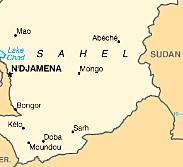Editor's Note: Over the last month, World Politics Review published Swiss journalist Kurt Pelda's diary of his three-week trip, during late February and March, to eastern Chad on the border with the Sudanese region of Darfur. The diary originally appeared in German on the Web site of the Swiss newspaper the Neue Zürcher Zeitung, and was published in WPR for the first time in English. Today we present Pelda's epilogue to his diary, penned exclusively for WPR. In it, Pelda provides a penetrating analysis of the conflict's causes, and of various proposals for its resolution. He also responds to criticism that parts of his diary, particularly his portrait of rebel leader Suleiman Jamous, received from various Darfur activists, many of whom expressed their criticism in letters to WPR.
With her right hand, the woman reveals her sagging breast, while she holds her emaciated baby in her left arm. She points to a bowl: the remains of a viscous, sickly green pap are sticking to its sides. Then her hand moves back to her breast and she makes a motion as if throwing something away. There is no need for a translator. The facial expressions and gestures say all: "For days now we have had nothing to eat but leaves. It is no wonder, then, that I have no more milk and my baby is starving." The town of Sam Ouandja, with its Christian mayor, gladly welcomed the Muslims from Darfur. During the first three weeks, the refugees subsisted on mangos and handouts from the hospitable local population. Later, the first trucks from the World Food Programme arrived and the U.N. Refugee Agency began to confront the logistical nightmare of providing services for the people from Daffaq. I ask the mayor of Daffaq what happened to the rest of the 10,000 inhabitants of his town. He does not know, he responds. He also does not know how many were killed in the bombardment and how many died during the 10 days of the long march to the CAR. All he knows is that he and his people do not want to return to Darfur until the war is over.
<<ad>>
Around four months after returning from my trip to the East of Chad, I am again among refugees from Darfur: this time not in Chad, but further South in the Central African Republic (CAR). Some 2,600 refugees arrived in the northeast of the CAR at the end of May: the first refugees from Darfur in this isolated and thinly populated area. In the late afternoon of May 15, their village was bombed by three planes, recounts the mayor of Daffaq, Khamis Abdelaziz Mohammed. The entire population fled. The refugees walked for 10 days and more than 350 kilometers before they reached the first settlement on the Central African side of the border.
Keep reading for free!
Get instant access to the rest of this article by submitting your email address below. You'll also get access to three articles of your choice each month and our free newsletter:
Or, Subscribe now to get full access.
Already a subscriber? Log in here .
What you’ll get with an All-Access subscription to World Politics Review:
A WPR subscription is like no other resource — it’s like having a personal curator and expert analyst of global affairs news. Subscribe now, and you’ll get:
- Immediate and instant access to the full searchable library of tens of thousands of articles.
- Daily articles with original analysis, written by leading topic experts, delivered to you every weekday.
- Regular in-depth articles with deep dives into important issues and countries.
- The Daily Review email, with our take on the day’s most important news, the latest WPR analysis, what’s on our radar, and more.
- The Weekly Review email, with quick summaries of the week’s most important coverage, and what’s to come.
- Completely ad-free reading.
And all of this is available to you when you subscribe today.

